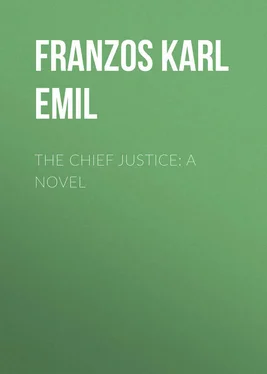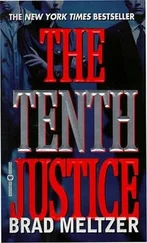Karl Franzos - The Chief Justice - A Novel
Здесь есть возможность читать онлайн «Karl Franzos - The Chief Justice - A Novel» — ознакомительный отрывок электронной книги совершенно бесплатно, а после прочтения отрывка купить полную версию. В некоторых случаях можно слушать аудио, скачать через торрент в формате fb2 и присутствует краткое содержание. Жанр: foreign_antique, foreign_prose, на английском языке. Описание произведения, (предисловие) а так же отзывы посетителей доступны на портале библиотеки ЛибКат.
- Название:The Chief Justice: A Novel
- Автор:
- Жанр:
- Год:неизвестен
- ISBN:нет данных
- Рейтинг книги:4 / 5. Голосов: 1
-
Избранное:Добавить в избранное
- Отзывы:
-
Ваша оценка:
- 80
- 1
- 2
- 3
- 4
- 5
The Chief Justice: A Novel: краткое содержание, описание и аннотация
Предлагаем к чтению аннотацию, описание, краткое содержание или предисловие (зависит от того, что написал сам автор книги «The Chief Justice: A Novel»). Если вы не нашли необходимую информацию о книге — напишите в комментариях, мы постараемся отыскать её.
The Chief Justice: A Novel — читать онлайн ознакомительный отрывок
Ниже представлен текст книги, разбитый по страницам. Система сохранения места последней прочитанной страницы, позволяет с удобством читать онлайн бесплатно книгу «The Chief Justice: A Novel», без необходимости каждый раз заново искать на чём Вы остановились. Поставьте закладку, и сможете в любой момент перейти на страницу, на которой закончили чтение.
Интервал:
Закладка:
Karl Emil Franzos
The Chief Justice: A Novel
INTRODUCTION
The remote Austrian province of Galicia has, in our generation, produced two of the most original of modern novelists, Leopold von Sacher-Masoch and Karl Emil Franzos. The latter, who is the author of the volume here presented to English readers, was born on the 25th of October 1848, just over the frontier, in a ranger's house in the midst of one of the vast forests of Russian Podolia. His father, a Polish Jew, was the district doctor of the town of Czorskow, in Galicia, where the boy received his first lessons in literature from his German mother. In 1858 Franzos was sent, on the death of his father, to the German College at Czernowitz; at the age of fourteen, according to the published accounts of his life, he was left entirely to his own resources, and gained a precarious livelihood by teaching. After various attempts at making a path for himself in science and in law, and finding that his being a Jew stood in the way of a professional career, he turned, as so many German Israelites have done before and since, to journalism, first in Vienna, then at Pesth, then in Vienna again, where he still continues to reside.
In 1876 Franzos published his first book, two volumes entitled Aus Halb-Asia ("From Semi-Asia"), a series of ethnological studies on the peoples of Galicia, Bukowina, South Russia, and Roumania, whom he described as in a twilight of semi-barbaric darkness, not wholly in the sunshine of Europe. This was followed in 1878 by Vom Don zur Donau ("From the Don to the Danube"), a similar series of studies in ethnography. Meanwhile, in Die Juden von Barnow ("The Jews of Barnow"), 1877, he had published his first collection of tales drawn from his early experience. He followed it in 1879 by Junge Liebe ("Young Love"), two short stories, "Brown Rosa" and "Brandenegg's Cousins," extremely romantic in character, and written in an elaborate and somewhat extravagant style. These volumes achieved a great and instant success.
The succeeding novels of Franzos have been numerous, and unequal in value. Moschko von Parma , 1880, was a pathetic study of the vicissitudes of a young Jewish soldier in the wars. In the same year Franzos published Die Hexe ("The Witch"). The best known of his writings in this country is Ein Kampf um's Recht ("A Battle for the Right"), 1882, which was published in English, with an Introduction by Mr. George MacDonald, and attracted the favourable, and even enthusiastic, notice of Mr. Gladstone. Der Präsident , which is here translated, appeared in Germany in 1884.
EDMUND GOSSE.CHAPTER I
In the Higher Court of Bolosch, an important Germano-Slavonic town of northern Austria, there sat as Chief Justice some thirty years ago, one of the bravest and best of those men on whom true justice might hopefully rely in that sorely tried land.
Charles Victor, Baron von Sendlingen, as he may be called in this record of his fate, was the last descendant of a very ancient and meritorious race which could trace its origin to a collateral branch of the Franconian Emperors, and which had once upon a time possessed rich lands and mines on the shores of the Wörther See: now indeed by reason of an adverse fate and the love of splendour of some of its scions, there had gradually come to be nothing left of all this save a series of high sounding titles. But the decline of fame and influence had not kept pace with the loss of lands and wealth; the Sendlingens had entered the service of the Hapsburgs and in the last two hundred years had given the Austrian Hereditary Dominions not only several brave generals, but an almost unbroken line of administrators and guardians of Justice. And so, although they were entirely dependent on their slender official salaries, they were reckoned with good reason among the first families of the Empire, and a Sendlingen might from his cradle count upon the office of Chief Justice of one of the Higher Courts. Even unkind envy, to say nothing of honest report, was obliged to admit that these hereditary patricians of Justice had always shown themselves worthy of their sacred office, and just as they regularly inherited certain physical characteristics-great stature, bright eyes and coal-black curly hair-so also gifted intellects, iron industry and a sense of duty which often enough bordered on self-denial, were always theirs. "The majesty of the Law is the most sacred majesty on earth." Thus spake the first of this family who had entered the service of the Imperial Courts of Justice, the Baron Victor Amadeus, Chief Judge of the Vienna Senate, in answer to an irregular demand of Ferdinand the Catholic, and his descendants held fast to the maxim in good days and evil, even in those worst days when Themis threatened, in this country also, to sink to the level of the venal mistress of Princes. The greatest of the Hapsburgs, Joseph II., knew how to value this at its right worth, and although he much disliked hereditary offices, he on this account appointed the Baron Charles Victor, in spite of his youth, as his father's successor in one of the most important offices of the State.
This was the grandfather of that Sendlingen whose story is to be told here, a powerful man of unusual strength of will who had again raised the reputation of the family to a most flourishing condition. But although everything went so well with him, the dearest wish of his heart was not to be realized: he was not to transmit office and reputation to his son. This son, Franz Victor, our hero's father, had to pass his life wretchedly in an insignificant position, the only one among the Sendlingens who went to his grave in mature years, unrenowned and indeed despised.
This fate had not overtaken him through lack of ability or industry. He too proved himself a true son of this admirable race; gifted, persevering, thorough, devoted heart and soul to his studies and his official duties. But a youthful escapade had embroiled him in the beginning of his career with father and relations: a girl of the lower orders, the daughter of the concierge at the Courts where his father presided, had become dear to him and in a moment of passion he had betrayed her. When the girl could no longer conceal the consequences of her fault, she went and threw herself at the feet of the Chief Justice imploring him to protect her from her parent's wrath. The old man could hardly contain his agony of indignation, but he summoned his son and having heard from his lips the truth of the accusation, he resolved the matter by saying: "The wedding will take place next Sunday. A Sendlingen may be thoughtless, he must never be a scoundrel." They were married without show and in complete secresy, and at once started for a little spot in the Tyrolean mountains whither Baron von Sendlingen had caused his son and heir to be transferred.
This event made a tremendous sensation. For the first time a Sendlingen had married out of his rank, the daughter of a menial too, and constrained to it by his father! People hardly knew how to decide which of the two, father or son, had sinned most against the dignity of the family; similar affairs were usually settled by the nobles of the land in all secresy and without leaving a stain on their genealogical tree. Even Kaiser Franz, although his opinions about morality were so rigid, once signified something of the kind to the honourable old judge, but he received the same answer as was given to his son. The embittered old man was indeed equally steadfast in maintaining a complete severance of the bonds between him and his only son; the letters which every mail from the Tyrol brought, were left unopened, and even in his last illness he would not suffer the outcast to be recalled.
After the death of the Judge, his son came to be completely forgotten: only occasionally his aristocratic relations used to recount with a shrug of the shoulders, that they had again been obliged to return a letter of this insolent fellow to the place where it came from. Nevertheless they learnt the contents of these letters from a good-natured old aunt: they told of the death of his first child, then of the birth of a boy whom he had called after his grandfather, and while he obstinately kept silence about the happiness or unhappiness of his marriage, he more and more urgently begged for deliverance from the God-forsaken corner of the globe in which he languished and for promotion to a worthier post.
Читать дальшеИнтервал:
Закладка:
Похожие книги на «The Chief Justice: A Novel»
Представляем Вашему вниманию похожие книги на «The Chief Justice: A Novel» списком для выбора. Мы отобрали схожую по названию и смыслу литературу в надежде предоставить читателям больше вариантов отыскать новые, интересные, ещё непрочитанные произведения.
Обсуждение, отзывы о книге «The Chief Justice: A Novel» и просто собственные мнения читателей. Оставьте ваши комментарии, напишите, что Вы думаете о произведении, его смысле или главных героях. Укажите что конкретно понравилось, а что нет, и почему Вы так считаете.












